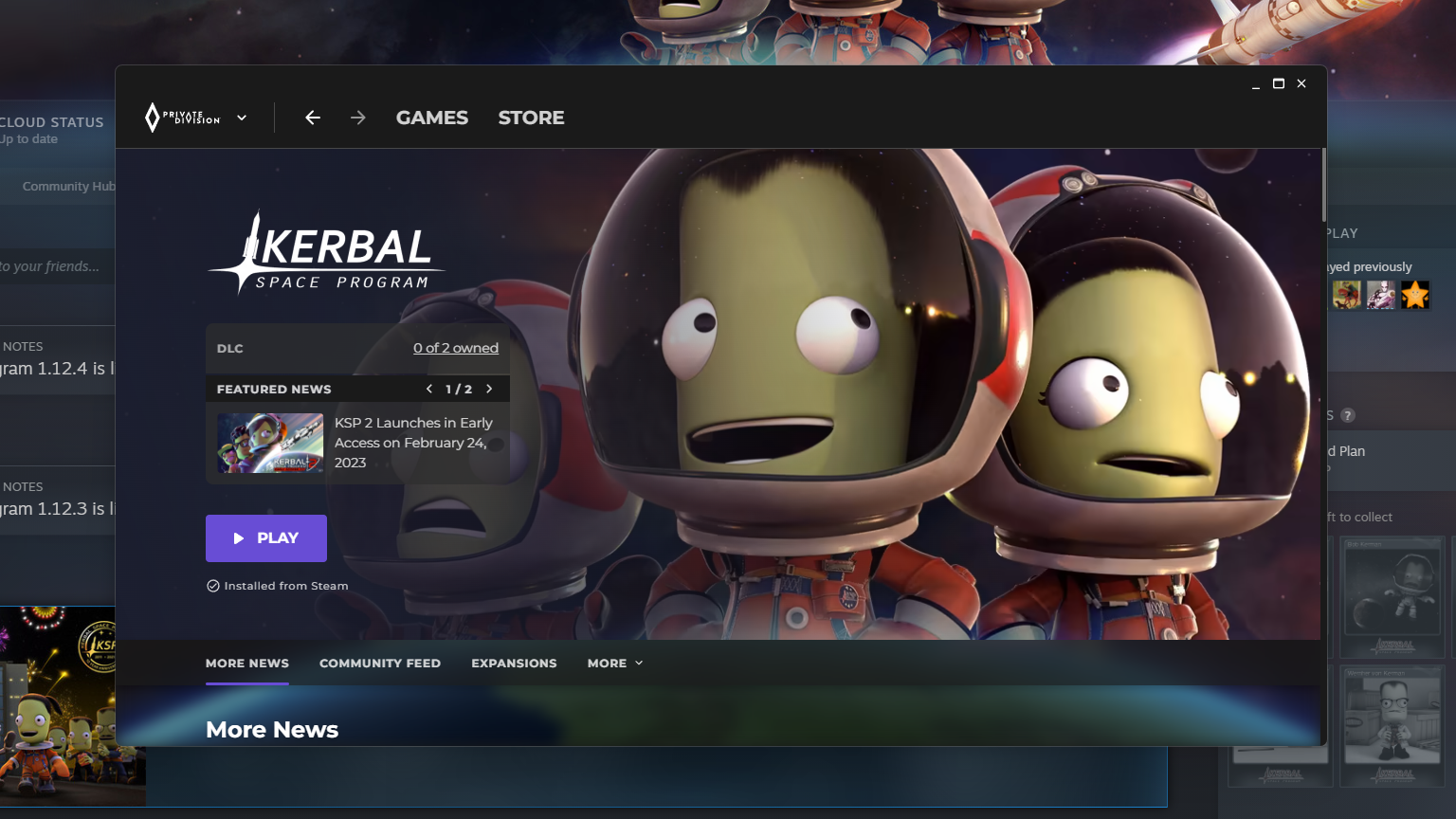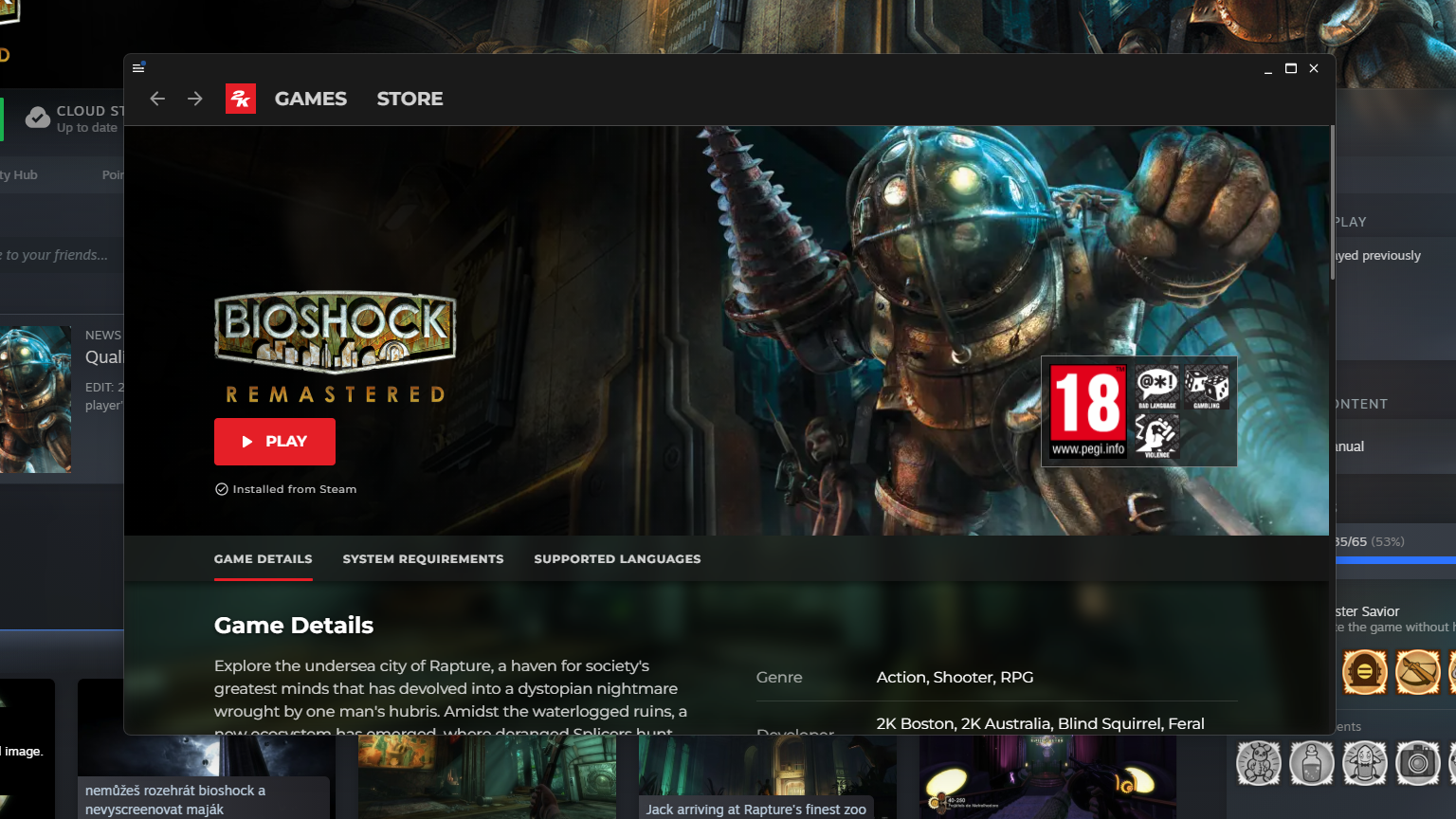2022 saw launcher bloat turn from a minor annoyance into a genuine problem
Patching a game to add a launcher is like doing an operation to put in an appendix, and it’s become alarmingly common this year. Once, I seem to recall, patches fixed bugs, corrected typos, and added new content, but since a September “Quality of life update” to the BioShock games (opens in new tab) added an utterly redundant new launcher, I’ve begun to worry that every update to my games library carries an unwelcome guest.
This is nothing new. The infestation of launchers in our start menus has been a nuisance for years, but February’s release of the Steam Deck (opens in new tab) means they’ve graduated from irritant to a potentially game-breaking problem. The addition of the 2K launcher to the BioShock Remastered Collection didn’t just add one more useless ritual you had to perform to play the thing you bought, it straight-up broke the games for users on Linux (opens in new tab) and Steam Deck. Valve’s Proton compatibility layer could translate BioShock itself from Windows to Linux without breaking a sweat, but the launcher? It had no clue what to do with that.
It’s an absurdity to jam a launcher into a six year-old remaster of a 15 year-old game in the first place, but when that launcher subsequently causes a failure to launch? You’ve accidentally done satire of yourself. And look, I’m no MBA-toting marketing guy, but I can’t imagine the scant purchasables available on the 2K launcher are a huge revenue generator for the company. Perhaps it’s an incredibly rich vein of player data: A rare and revealing insight into the behaviour and motivations of the six of us still playing BioShock in the year of our Lord 2022.
This wouldn’t be worth complaining about—which is not to say I wouldn’t still complain about it—if it were an isolated incident, but it keeps happening. A November update to Kerbal Space Program added a launcher whose sole reason for existing seemed to be to advertise KSP 2, and players immediately took to Reddit (opens in new tab) and the Steam forums (opens in new tab) to holler about broken mods and Steam Deck screwiness. As I write this, EA is trying to cobble together a fix (opens in new tab) for Deck failures caused by its Origin-replacing EA App.
Is any of this worth it? Have you ever launched a game from Steam, only to watch Origin or UPlay spark to life, and thought “Ah, yes, how pleased I am to see you”? Of course you haven’t, unless you own EA or Ubisoft stock. These things don’t exist to make games better, they exist to give business liches and C-suite types a little warm glow.
It’s all the more irritating to me because, my friends, there’s a better world. I’ve seen it. Forgive my blasphemy, but it’s called the Nintendo Switch, a hand-size block of glass and plastic with all the power of a tea candle. I bought one a few months ago; it lives beneath my television and asks me for nothing. When I turn it on—which I do by picking up the controller that sits on my coffee table and pawing at its large, friendly buttons—it clicks instantly to consciousness and into whatever game I was playing last. At no point in this three-second process does any software launch beyond the game itself, at least none that I can perceive.
Don’t get me wrong, in every respect besides actually launching the games, the Switch is a worse way to play than my ox of a computer. Games run worse, cost more, and for some reason I have to pay Nintendo to make full use of the internet connection I already pay someone else for. But the untroubled experience of starting games on the console has almost driven me to resent the openness of PC as a platform: the very thing that makes it great, but also the thing that allows this launcher nonsense to proliferate unchecked.
Have you ever launched a game from Steam, only to watch Origin or UPlay spark to life, and thought “Ah, yes, how pleased I am to see you”? Of course you haven’t, unless you own EA or Ubisoft stock.
There’s reason for hope. The beginning of this year saw Bethesda terminate its launcher (opens in new tab) in favour of migrating back to Steam. Admittedly, games like Fallout and Skyrim have their own, game-specific launchers that let you fiddle with options and data files, and which remain maddeningly unnavigable with a gamepad, but it’s a start. I suppose Steam is, at the end of the day, another launcher, but it’s never once fired up when I launch something I bought on the Epic Games Store or GOG.
It would’ve been nice if we could get a handle on this years ago when launchers were just an inconvenience, but now they’re actively breaking games surely something’s gotta give. I want to stop getting up off my sofa to enter a 2FA code after the EA App signs me out for the millionth time, and Steam Deck users want their games to actually work. Please, let 2023 be the year we all hit the unlaunch button.
Patching a game to add a launcher is like doing an operation to put in an appendix, and it’s become alarmingly common this year. Once, I seem to recall, patches fixed bugs, corrected typos, and added new content, but since a September “Quality of life update” to the BioShock games (opens in new tab) added an utterly redundant new launcher, I’ve begun to worry that every update to my games library carries an unwelcome guest.
This is nothing new. The infestation of launchers in our start menus has been a nuisance for years, but February’s release of the Steam Deck (opens in new tab) means they’ve graduated from irritant to a potentially game-breaking problem. The addition of the 2K launcher to the BioShock Remastered Collection didn’t just add one more useless ritual you had to perform to play the thing you bought, it straight-up broke the games for users on Linux (opens in new tab) and Steam Deck. Valve’s Proton compatibility layer could translate BioShock itself from Windows to Linux without breaking a sweat, but the launcher? It had no clue what to do with that.
It’s an absurdity to jam a launcher into a six year-old remaster of a 15 year-old game in the first place, but when that launcher subsequently causes a failure to launch? You’ve accidentally done satire of yourself. And look, I’m no MBA-toting marketing guy, but I can’t imagine the scant purchasables available on the 2K launcher are a huge revenue generator for the company. Perhaps it’s an incredibly rich vein of player data: A rare and revealing insight into the behaviour and motivations of the six of us still playing BioShock in the year of our Lord 2022.
This wouldn’t be worth complaining about—which is not to say I wouldn’t still complain about it—if it were an isolated incident, but it keeps happening. A November update to Kerbal Space Program added a launcher whose sole reason for existing seemed to be to advertise KSP 2, and players immediately took to Reddit (opens in new tab) and the Steam forums (opens in new tab) to holler about broken mods and Steam Deck screwiness. As I write this, EA is trying to cobble together a fix (opens in new tab) for Deck failures caused by its Origin-replacing EA App.
Is any of this worth it? Have you ever launched a game from Steam, only to watch Origin or UPlay spark to life, and thought “Ah, yes, how pleased I am to see you”? Of course you haven’t, unless you own EA or Ubisoft stock. These things don’t exist to make games better, they exist to give business liches and C-suite types a little warm glow.
It’s all the more irritating to me because, my friends, there’s a better world. I’ve seen it. Forgive my blasphemy, but it’s called the Nintendo Switch, a hand-size block of glass and plastic with all the power of a tea candle. I bought one a few months ago; it lives beneath my television and asks me for nothing. When I turn it on—which I do by picking up the controller that sits on my coffee table and pawing at its large, friendly buttons—it clicks instantly to consciousness and into whatever game I was playing last. At no point in this three-second process does any software launch beyond the game itself, at least none that I can perceive.
Don’t get me wrong, in every respect besides actually launching the games, the Switch is a worse way to play than my ox of a computer. Games run worse, cost more, and for some reason I have to pay Nintendo to make full use of the internet connection I already pay someone else for. But the untroubled experience of starting games on the console has almost driven me to resent the openness of PC as a platform: the very thing that makes it great, but also the thing that allows this launcher nonsense to proliferate unchecked.
Have you ever launched a game from Steam, only to watch Origin or UPlay spark to life, and thought “Ah, yes, how pleased I am to see you”? Of course you haven’t, unless you own EA or Ubisoft stock.
There’s reason for hope. The beginning of this year saw Bethesda terminate its launcher (opens in new tab) in favour of migrating back to Steam. Admittedly, games like Fallout and Skyrim have their own, game-specific launchers that let you fiddle with options and data files, and which remain maddeningly unnavigable with a gamepad, but it’s a start. I suppose Steam is, at the end of the day, another launcher, but it’s never once fired up when I launch something I bought on the Epic Games Store or GOG.
It would’ve been nice if we could get a handle on this years ago when launchers were just an inconvenience, but now they’re actively breaking games surely something’s gotta give. I want to stop getting up off my sofa to enter a 2FA code after the EA App signs me out for the millionth time, and Steam Deck users want their games to actually work. Please, let 2023 be the year we all hit the unlaunch button.




